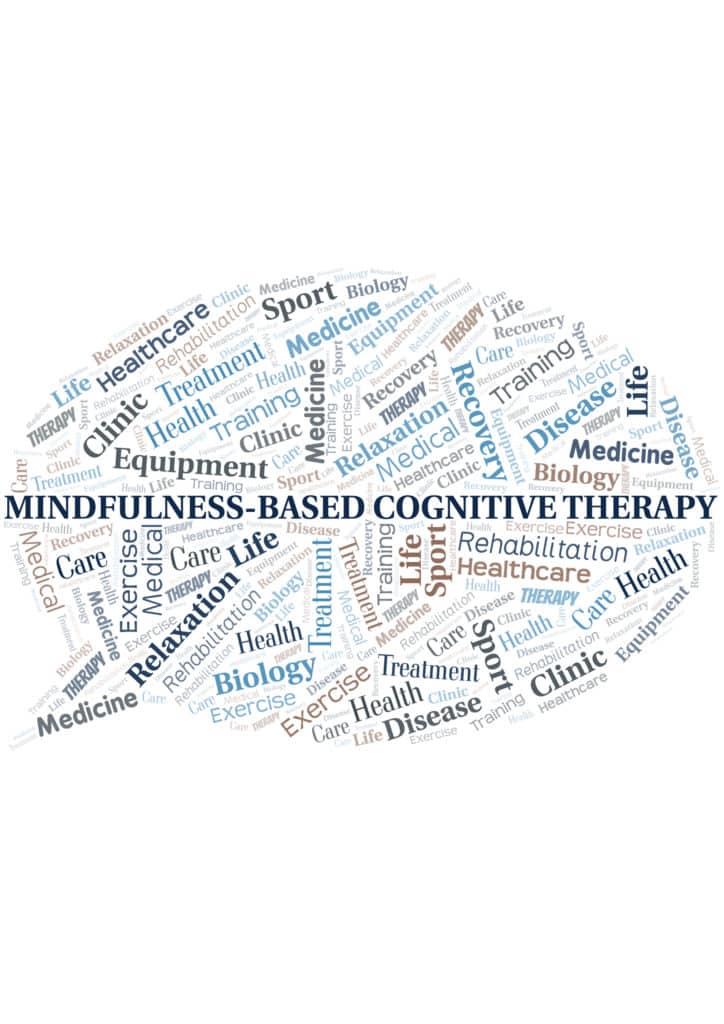Mindfulness-Based Cognitive Therapy Treatment for Depression and Anxiety

Table of Contents
What is Mindfulness-Based Cognitive Therapy?
Mindfulness-based cognitive therapy (MBCT) is a psychological treatment developed for people with depressive disorders. However, this therapy is also effective for other mental disorders, including bipolar, anxiety, and unhappiness. (Corey, 2021)
Aaron Beck created cognitive Therapy to help individuals with depression and anxiety. Beck says that our reactions are a response to faulty thinking, which is harmful or unhelpful, and these are called cognitive distortions.
Mindfulness is being aware created when you are paying attention to the purpose the current moment serves, and you are not judging it. Acceptance is a way of accepting your current state of being without judging yourself for being angry or triggered by a situation. This helps bring a healthy awareness to areas that have room for improvement, and using mindfulness-based cognitive therapy can help you show yourself grace and mercy while progressing.
The MBCT approach combines cognitive-behavioral therapy (CBT) and Mindfulness-based stress reduction (MBSR) principles. The program teaches cognitive therapy strategies for managing emotional issues to help prevent and manage depression. Participants also learn and practice mindfulness to become more aware of their condition and how to manage it.
What is Mindfulness-based stress reduction therapy for?
It is used for treating depression and generalized anxiety disorder in research study participants. Individuals showed much greater decrease in depressive symptoms in diabetics.
Mindfulness-based stress reduction therapy
Mindfulness-based stress reduction therapy says that our discontent comes from the constant desire to want our situation to be different than it currently is. It helps individuals live in the present and enjoy the process, and it is typically an eight to 10-week program.
It utilizes meditation, and it is not looking to make significant cognitive changes, but more so awareness and removing harsh judgments. Body scans are used to be mindful of all of the different feelings in the body, and this is carried into other typical activities throughout the day. Essentially you are learning your boundaries and how to love yourself without feeling the need to change everything.
Features of Mindfulness-Based Cognitive Therapy Program
Mindfulness-based cognitive therapy includes the use of self-compassion and kindness and allowing us to express goodwill towards yourself and others. Self companion is an important aspect because it allows you to increase your emotional intelligence, increased happiness, optimism, positive emotions, life satisfaction, connection towards others and compassion towards others.
Every MBCT program includes the following essential features:
An 8-week Course
The program usually lasts for eight weeks, and during that time, the instructor combines mindfulness with cognitive therapy to help people with psychological-related problems. The program is done in two-hour weekly sessions, and it integrates principles from mindfulness-based stress reduction therapy.
Session Expectations
When going to mindfulness-based cognitive therapy here is a little bit of what you will be doing in your sessions. You will begin with identifying negative automatic thoughts such as “why should I bother trying, it never works for me anyways”. That is a cognitive distortion that is unhelpful that is an automatic thought you will have to become mindful of.
Sharing about your life experiences and how to be more compassionate and kind to yourself acknowledging that you have been through difficult things even if other people may have seemed to “have it worse”. Learning breathing techniques tp help you focus on the present and relax your body via the vagus nerve that tells your body to physically relax along with your mind.
Implementing meditation and mindful walking, learning how to experience events and let go of what is unhelpful or unnecessary. Then you will acknowledge thoughts as just being thoughts and not things that define us or have power over us, “thoughts are not facts”. (Corey, 2021)
Group Format
The program is taught in a group format, including 5-25 participants and 1-2 instructors. While it is possible to have one-to-one sessions, the group therapy approach makes it easier to learn meditation, and it’s a cost-effective option.
Homework
One of the guiding principles of MBCT is that participants are required to develop skills to deal with psychological problems caused by stress, sadness, and anxiety. Although group work helps, self-awareness is also crucial, and homework allows participants to take the time to practice meditation and cognitive therapy lessons.
How Effective is Mindfulness-Based Cognitive Therapy?

People with psychological disorders who enroll in the program can expect to feel much better after the 8-week course. This study points to the effectiveness of the program.
If you’re considering signing up for MBCT, here are some of the ways the program can help you:
- Mindfulness-based cognitive therapy helps people find ways to feel less worried and anxious about things in their lives. Also, the lessons help them to gain control over mental problems.
- People who follow through with the MBCT become more aware of their thoughts, feelings, and reactions without being overwhelmed by them.
- Participants also learn to be kinder, appreciate where they find themselves, and deal with issues more balanced and practiced.
Some conditions could make or mar one’s results from mindfulness-based cognitive therapy. They are:
- Your ability to follow instructions
- Your ability to work with the group
- Your ability to work by yourself
- Your willingness to learn and grow
If you follow the instructions and practice the principles with your group and yourself, the results will be positive.
Advice for Anyone Interested in Mindfulness-Based Cognitive Therapy
MBCT works, but you have to be committed to the program if you want to see results. Here are some of the best tips to help you benefit from the experience.
Commit to Learning the Techniques
You must understand the strategies instructors teach before practicing them. However, these scientific approaches are the key to overcoming depressive disorders.
For instance, people who have suffered from depression tend to return to automatic cognitive processes that may trigger an episode. MBCT teaches participants to recognize when automated processes occur and how to change their reaction to a reflection – observing them without judgment.
If you can successfully pick out negative thoughts as they come, you can prevent depressive episodes. So, be committed to learning the principles and applying them.
Work With the Group
The mindfulness therapy group is like a support group – everyone involved (except the instructor) is there because they want a solution to depression and other related mental problems. If you work together, it is easier to achieve the same results.
So, don’t be a loner and engage with the group as much as possible.
Practice Mindfulness and Cognitive Therapy Alone
The essence of MBCT is to help you be in control, to manage depression-causing situations without outside help. As you go through the program, practice the strategies on your own and give feedback to the instructor.
Taking homework seriously is also an avenue to getting results. Implementing meditation into your daily schedule even if it’s only 5-10 minutes in the morning or before bed.
References:
Corey, G. (2021). Theory and practice of counseling and psychotherapy. Cengage.
Originally posted 2022-05-06 18:26:42.
Megan Santiago
Latest posts by Megan Santiago (see all)
- How to Find a Trauma Therapist in Tampa - September 30, 2024
- Get Your Child to Listen: A Clear-Cut Way To Feel Heard - March 10, 2024
- Help With Bills – How to Get Financial Assistance - March 10, 2024
